Checkout
Top Celebrities
- 50 Cent
- Aaron Carter
- Abigail Clancy
- Academy Awards
- Adam Lambert
- Adam Sandler
- Adnan Ghalib
- Adrian Grenier
- Adriana Lima
- Adrianne Curry
- Adrienne Bailon
- Aida Yespica
- Aisha Tyler
- Aisleyne Horgan-Wallace
- Akon
- Al Gore
- Alaina Alexander
- Alana Curry
- Alec Baldwin
- Aleksandra Jordan
- Alena Seredova
- Alessandra Ambrosio
- Alessia Ventura
- Alex Grace
- Alex Rodriguez
- Ali Larter
- Ali Lohan
- Alicia Keys
- Alina Vacariu
- Allegra Versace
- Alley Bagget
- Alyssa Milano
- Amanda Bynes
- Amanda Harrington
- Amanda Peet
- America Ferrera
- American Idol
- Amy Polumbo
- Amy Winehouse
- Ana Beatriz Barros
- Ana Kournikova
- Anahi Gonzalez
- Andy Dick
- Andy Garcia
- Ang Lee
- Angelina Jolie
- Angie Harmon
- Anna Faris
- Anna Friel
- Anna Kournikova
- Anna Lynne McCord
- Anna Nicole Smith
- Anna Paquin
- Annalynne McCord
- Anne Hathaway
- Anne Heche
- Anthony Hopkins
- Antonella Barba
- Antonio Banderas
- April Scott
- Arnold Schwarzenegger
- Aruna Shields
- Ashanti
- Ashlee Simpson
- Ashley Dupre
- Ashley Greene
- Ashley Olsen
- Ashley Tisdale
- Ashton Kutcher
- Aubrey O'Day
- Audrina Patridge
- Austin Green
- Avril Lavigne
- Bai Ling
- Bam Margera
- Bar Refaeli
- Barack Obama
- Barbra Streisand
- Barron Hilton
- Ben Affleck
- Ben Stein
- Ben Stiller
- Bernie Mac
- Beyonce
- Beyonce Knowles
- Bikini Pictures
- Bill O'Reilly
- Bjork
- Blake Lively
- Bobby Brown
- Bono
- Borat
- Brad Pitt
- Brandon Davis
- Brenda Song
- Bridget Marquardt
- Britney Spears
- Brittany Murphy
- Brittany Snow
- Brody Jenner
- Brook Shields
- Brooke Burke
- Brooke Burns
- Brooke Hogan
- Brooke Shields
- Bruce Willis
- Cameron Diaz
- Camilla Belle
- Candice Michelle
- Caprice Bourett
- Caption Me
- Carmen Electra
- Carrie Prejean
- Carrie Underwood
- Cassie
- Cate Blanchett
- Catherine Zeta-Jones
- Celebrities
- Celebrity Gossip
- Celebrity Pictures
- Celine Dion
- Chad Michael Murray
- Chanelle Hayes
- Charisma Carpetner
- Charlie Sheen
- Charlize Theron
- Cheryl Cole
- Cheryl Tweedy
- Chris Benoit
- Chris Brown
- Chris Tarrant
- Christian Bale
- Christie Binkley
- Christina Aguiera
- Christina Aguilera
- Christina Applegate
- Christina Milian
- Christina Ricci
- Christoper Masterson
- Christopher Walken
- Chuck Nice
- Ciara
- Cindy Crawford
- Cindy Margolis
- Cindy Taylor
- Claudia Schiffer
- Clay Aiken
- Clive Owen
- Coco
- Cory Lidle
- Courteney Cox
- Courtney Cox
- Courtney Love
- Criss Angel
- Cristiano Ronaldo
- Cyndi Lauper
- Dakota Fanning
- Dane Cook
- Dania Ramirez
- Daniel Craig
- Daniel Radcliffe
- Daniel Smith
- Danielle Lloyd
- Danity Kane
- Dannii Minogue
- Danny Boyle
- Dave Navarro
- David Beckham
- David Blaine
- David Faustino
- David Hasselhoff
- David Letterman
- David Spade
- Dean McDermott
- Dean Sheremet
- Debbie Rowe
- Delta Goodrem
- Denise Milani
- Denise Richards
- Dennis Leary
- Diddy
- Dina Lohan
- Diora Baird
- Dita Von Teese
- DJ AM
- DMX
- Don Cheadle
- Don Imus
- Donal Logue
- Donald Trump
- Doug Reinhardt
- Dr Dre
- Drew Barrymore
- Dustin Diamond
- Eddie Murphy
- Edward Norton
- Elin Woods
- Elisha Cuthbert
- Eliza Dushku
- Elizabeth Hurley
- Elle Macpherson
- Ellen Pompeo
- Elton John
- Elyse Umemoto
- Emily Blun
- Emily Osment
- Emily Scott
- Eminem
- Emma B
- Emma Roberts
- Emma Watson
- Emmanuelle Chriqui
- Emmy Rosum
- Erich Schultz
- Erin Wasson
- Eva Green
- Eva Longoria
- Eva Mendes
- Evangeline Lilly
- Fabiana Tambosi
- Farrah Fawcett
- Fat Joe
- Fergie
- Fernanda Tavares
- Flavor of Love
- Foxy Brown
- Freida Pinto
- Gavin Rossdale
- Gemma Atkinson
- George Carlin
- George Clooney
- George Michael
- Gilles Marini
- Gisele Bundchen
- Good Charlotte
- Grey's Anatom
- Guy Ritchie
- Gwen Stefani
- Gwyneth Paltrow
- Hail Gossip Blogs
- Hails Hottie Picks
- Hails Recap
- Haired Pea
- Halle Berry
- Harrison Ford
- Harry Morton
- Harry Potter
- Hayden Panettiere
- Haylie Duff
- Heath Ledger
- Heather Graham
- Heather Locklear
- Heather Mills
- Heidi Klum
- Heidi Montag
- Helena Christensen
- Hilary Duff
- Hilary Swank
- Hillary Clinton
- Holly Madison
- Holly Valance
- Hot Girls
- Hot kiss scene
- Howard K. Stern
- Howard Stern
- Hugh Grant
- Hugh Hefner
- Hugh Jackman
- Hulk Hogan
- Ice Cube
- Iphone
- Irina Shaykhilsamova
- Isaac Cohen
- Isaac Hayes
- Isabel Fontana
- Isaiah Washington
- Ivanka Trump
- Izabel Goulart
- Jack Bauer
- Jack Black
- Jack Nicholson
- Jackie Chan
- Jade
- Jaime Pressly
- Jake Gyllenhaal
- Jakki Degg
- James Blunt
- James Bond
- Jami Miller
- Jamie Foxx
- Jamie Hince
- Jamie Lynn Spears
- Jamie Oliver
- Jamie Pressly
- Jamie-Lynn Sigler
- Jane Fonda
- Jane Olson
- Janet Jackson
- Jaslene Gonzalez
- Jason Filyaw
- Jason Lee
- Jason Lewis
- Jason Mesnick
- Jay-Z
- Jayden
- Jayden James
- Jeff Goldblum
- Jenna Fischer
- Jenna Jameson
- Jennie Garth
- Jennifer Aniston
- Jennifer Ellison
- Jennifer Garner
- Jennifer Hawkins
- Jennifer Hudson
- Jennifer Lopez
- Jennifer Love Hewitt
- Jennifer Morrison
- Jennifer Walcott
- Jenny Frost
- Jenny McCarthy
- Jeremy Piven
- Jermaine Dupri
- Jerry Seinfeld
- Jessica Alba
- Jessica Biel
- Jessica Lowndes
- Jessica Simpson
- Jessica White
- Jessie Jane
- Jewel
- Jim Carey
- Jim Carrey
- Jimmy Fallon
- Joan Rivers
- Joanna Krupa
- Joaquin Phoenix
- Jodie Marsh
- Jodie Sweetin
- Joe Francis
- Joe Jackson
- Joe Simpson
- Joel Madden
- John Cusack
- John Lennon
- John Mayer
- John Ritter
- John Stewart
- John Travolta
- Johnny Depp
- Johnny Fairplay
- Johnson Rocks
- Jojo
- Jolene Blalock
- Jon Gosselin
- Jon Lovitz
- Jonas Brothers
- Jonathan Rhys Meyers
- Jordan
- Jordan Bratman
- Jorge Nunez
- Josh Duhamel
- Josh Hartnett
- Josie Maran
- Joss Stone
- Jude Law
- Julia Roberts
- Julia Stiles
- Julianne Hough
- Juliette Lewis
- Justin Bieber
- Justin Gaston
- Justin Timberlake
- Juveline
- Kaiane Aldorino
- Kaley Cuoco
- Kanye West
- Kardashian
- Kari Ann Peniche
- Karina Smirnoff
- Karolina Kurkova
- Kate Beckinsale
- Kate Bosworth
- Kate Gosselin
- Kate Hudson
- Kate Moss
- Kate Winslet
- Katharine Mcphee
- Katherine Heigl
- Katherine McPhee
- Kathy Hilton
- Katie Downes
- Katie Holmes
- Katie Lohmann
- Katie Price
- Katie Rees
- Katy Perry
- Ke$ha
- Keanu Reeves
- Keeley Hazell
- Keira Knightley
- Keisha Buchanan
- Keith Richards
- Keith Urban
- Kelly Bensimon
- Kelly Brook
- Kelly Clarkson
- Kelly Osbourne
- Kelly Pickler
- Kelly Ripa
- Kelly Rutherford
- Kendra Jade
- Kendra Wilkinson
- Keri Russell
- Kerri Kasem
- Kevin Costner
- Kevin Federline
- Khloe Kardashian
- Kiefer Sutherland
- Kim Kardashian
- Kimberly Stewart
- Kimora Lee Simmons
- Kingston
- Kirsten Dunst
- Kobe Bryant
- Kourtney Kardashian
- Kristanna Loken
- Kristen Bell
- Kristen Dalton
- Kristen Stewart
- Kristin Cavallari
- Kristin Davis
- Kristy Swanson
- Kurt Cobain
- Kylie Minogue
- L.L. Cool J
- Lacey Chabert
- Lady GaGa
- Lance Bass
- Larry Birkhead
- Larry King
- Larry Rudolph
- Laura Prepon
- Lauren Conrad
- Lauren Hutton
- Lauren Nelson
- Laurence Fishburne
- Leann Rimes
- Lee Ann Rimes
- Leelee Sobieski
- Leighton Meester
- Leo DiCaprio
- Leona Lewis
- Leonardo DiCaprio
- Leticia Cline
- Lil Wayne
- Lilly Allen
- Lily Allen
- Lindsay Lohan
- Lindsey Vonn
- Lionel Richie
- Lisa Gleave
- Lisa Loeb
- Lisa Marie Scott
- Lisa Ray
- Lisa Rhinna
- Lisa Snowdon
- Liv Tyler
- Lori Loughlin
- Louise Redknapp
- Lucie Silvas
- Lucy Liu
- Lucy Pinder
- Luke Wilson
- Maddox
- Madonna
- Maggie Gyllenhaal
- Mandy Moore
- Marcia Cross
- Maria Menounos
- Maria Sergeyeva
- Mariah Carey
- Mario Lopez
- Marisa Miller
- Marisa Tomei
- Mark Wahlberg
- Mary J. Blige
- Mary-Kate Olsen
- Mary-Louise Parker
- Maryse Ouellet
- Matt Damon
- Matt Lauer
- Matthew McConaughey
- Matthew Perry
- May Andersen
- McShane
- Meg Ryan
- Meg White
- Megan Fox
- Meghan McCain
- Mel Gibson
- Melania Knauss
- Melanie Brown
- Mena Suvari
- Michael Douglas
- Michael Jackson
- Michael Moore
- Michelle Marsh
- Michelle McCool
- Michelle Obama
- Michelle Rodriguez
- Michelle Trachtenberg
- Michelle Williams
- Mick Jagger
- Mike Tyson
- Mila Kunis
- Miley Cyrus
- Milo Ventimiglia
- Minka Kelly
- Miranda Kerr
- Mischa Barton
- Miss Nevada
- Miss Universe 2010
- Moby
- Monica Bellucci
- Morgan Freeman
- Movies
- Myleene Klass
- Nadine Velasquez
- Nadya Suleman
- Naomi Campbe
- Naomi Watts
- Nas
- Natalie Maines
- Natalie Portman
- Natasha Bedingfield
- Natasha Henstridge
- Natasha Richardson
- Neha Dhupia
- new gossips
- new movie
- New York Yankees
- Nick Carter
- Nick Jonas
- Nick Lachey
- Nicky Hilton
- Nicolas Cage
- Nicole Eggert
- Nicole Kidman
- Nicole Richie
- Nicole Scherzinger
- Nicolette Sheridan
- Nikki Ziering
- Nipple Slip
- Notorious B.I.G.
- Octomom
- Odette Yustman
- OJ Simpson
- Olga Kurylenko
- olivi
- Olivia Mojica
- Olivia Munn
- Olivia Newton John
- Olivia Wilde
- Oprah
- Orlando Bloom
- Orlando Brown
- Oscar de la Hoya
- Oscars
- Owen Wilson
- Pamela Anderson
- Paris Hilton
- Patricia Arquette
- Patrick Dempsey
- Patrick McDermott
- Patrick Swayze
- Paul Oakenfold
- Paul Rudd
- Paul Walker
- Paula Abdul
- Penelope Cruz
- Perez Hilton
- Pete Doherty
- Pete Wentz
- Peter Andre
- Peter Facinelli
- Peter Greene
- Petra Nemcova
- Phil Collins
- Phoebe Price
- Pink
- Piper Perabo
- Polls
- Primetime Emmys
- Prince Harry
- Princess Beatrice
- Queen Elizabeth
- Queen Latifah
- R. Kelly
- Rachael Ray
- Rachel Bilson
- Rachel Hunter
- Rachel Stevens
- Rachel Uchitel
- Rachelle Lefevre
- Randy Quaid
- Ray J
- Reese Witherspoon
- Renee Olstead
- Renee Zellweger
- Richard Lugner
- Richie Sambora
- Ricky Gervais
- Rihanna
- Rima Fakih
- Rob Schneider
- Robbie Williams
- Robert Pattinson
- Ron Jeremy
- Rosario Dawson
- Rosie Huntington
- Rosie Odonnell
- Roxanne Pallet
- Rumer Willis
- Russell Brand
- Russell Crowe
- Ryan Phillippe
- Ryan Seacres
- Sacha Baron Cohen
- Sadie Frost
- Salma Hayek
- Samantha Ronson
- Samia Smith
- Samuel L. Jackson
- Sandee Westgate
- Sandra Bullock
- Sanjaya
- Sara Foster
- Sarah Harding
- Sarah Jessica Parker
- Sarah Michelle Gellar
- Sarah Shahi
- Sarah Silverman
- Scarlett Johansson
- Scientology
- Sean Penn
- Sean Preston
- Selena Gomez
- Selita Ebanks
- Selma Blair
- sex tape
- Shakira
- Shana Prevette
- Shanna Moakler
- Shaquille O'Neal
- Sharon Stone
- Shauna Sands
- Shawn Johnson
- Shenae Grimes
- Sheryl Crow
- Shia LaBeouf
- Shiloh Nouvel Pitt
- Shyamali Malakar
- Sienna Miller
- Simon Cowell
- Sin City
- Sofia Vergara
- Sonam Kapoor
- Sophie Monk
- South Park
- Stacy Dash
- Stacy Keibler
- Star Jones
- Stavros Niarchos
- Steve Irwin
- Steve O
- Steven Spielberg
- Suge Knight
- Sunny Leone
- Suri Cruise
- Susan Boyle
- Sutton Pierce Federline
- Sylvester Stallone
- T.I.
- Tailor Made
- Tania Zaetta
- Tara Conner
- Tara Elizabeth Conner
- Tara Elizabeth Connor
- Tara Reid
- Tatu
- Taylor Lautner
- Taylor Momsen
- Taylor Swift
- Team Bill
- Ted Hughes
- Tera Patrick
- Teresa Palmer
- Teri Harrison
- Teri Hatcher
- The Dark Knight
- The Game
- The Morning Quicky
- Tiffany Taylor
- Tiger Woods
- Tila Tequila
- Tobey Maguire
- Tom Arnold
- Tom Brady
- Tom Cruise
- Tom Hanks
- Tommy Lee Jones
- Tony parker
- Tori Spelling
- Travis Barker
- Tricia Helfer
- Tyler Perry
- Tyra Banks
- Uffie
- Uma Thurman
- Usher
- Vanessa Hudgens
- Vanessa Marcil
- Vanessa Minnillo
- Victoria Beckham
- Victoria Justice
- Victoria Silvstedt
- Vida Guerra
- Vin Diesel
- Vince Vaughn
- Virginia Tech
- Website News
- Weird Al
- Wesley Snipes
- Whitney Houston
- whitney Port
- Whoopi Goldberg
- Will Ferrell
- Willem Defoe
- Wilmer Valderrama
- Winona Ryder
- Woody Harrelson
- Woody Harrison
- Yesica Toscanni
- YouTube
- Yukie Kawamura
- Zac Efron
- Zachery Ty Bryan
- Zooey Deschane
King Charles didn’t invite most of the non-royal dukes to the coronation
Author: | Filed under: CelebritiesEvery few weeks, we’ve been getting these stories and they’re one of my favorite things of the year: British aristocrats are super-salty about not being invited to King Charles’s coronation. The Earl of Fancybreeches and the Duke of Trousersnape have truly been sending strongly-worded parchments to the palace, demanding their Chubbly invite posthaste. They’re throwing tantrums about it in the media, they’re inundating the Duke of Norfolk with rage-emails and irate phone calls. It’s glorious, but it does beg the question: why didn’t Charles prioritize the aristocracy for invites? There’s a lot of talk about fewer seats, but that hasn’t stopped Charles from inviting foreign heads of state and Camilla’s entire f–king extended family? Surely Lord Toadscrotum is *as* important?? Well, interestingly enough, it looks like the king massively snubbed all of the “grandest aristocrats” – most of the 24 non-royal dukes.
The Coronation, now just three weeks away, will be seen by many as a display of splendid pageantry and tradition – and by critics as a blast of flummery and fanfare. But, to King Charles, it evidently represents a unique chance to begin a new era – one quite distinct from that of his late mother, Queen Elizabeth. Nowhere, I can reveal, will this be more starkly apparent than in the exclusion from the service in Westminster Abbey of most of the grandest aristocrats in the land, along with almost all their fellow hereditary peers. Even most of the 24 non-royal dukes – the most senior rank in the peerage – are not exempt from the cull, despite the fact that one of their number, the Duke of Norfolk, is orchestrating every detail of the Coronation in his role as Earl Marshal.
The Duke of Rutland, who lives in one wing of his 365-room family seat, Belvoir Castle in Leicestershire, while his wife, Emma, lives in another, is one of the many dismayed and bewildered by their exclusion. ‘I have not been asked,’ he tells me, saying that he does ‘not really understand’ why. ‘It has been families like mine that have supported the Royal Family over 1,000 years or thereabouts,’ adds the Duke, who has two sons and three lively daughters, Lady Violet, Lady Alice and Lady Eliza Manners.
But not only did peers attend coronations, they were required to ‘give the kiss of homage and touch the Crown’ – a vestige of feudal allegiance to the monarch, for whom, it was implied, they would fight and, if necessary, die on the field of battle. At Queen Elizabeth’s coronation, a royal duke, Prince Philip, the Duke of Edinburgh, took off his coronet, ascended the steps of the throne, knelt before the Queen, placed his hands between hers and ‘pronounced his words of homage’. He was followed by two more royal dukes, the Dukes of Gloucester and Kent.
Then it was the turn of the senior peer of each ‘degree’ – the duke, marquess, earl, viscount and baron with the oldest titles. As they ‘paid homage in like manner’, their fellow peers of the respective ‘degree’, knelt in their places in the Abbey, removed their coronets, and also said their words of homage. A Buckingham Palace spokesman declines to comment, but a royal source insists that ‘a good representation of non-royal dukes will be in attendance’.
The Duke of Rutland will presumably console himself at Belvoir, where a collection of his family’s coronation robes is on display. Perhaps the disappointment will be even more acute for the Duke of Somerset. ‘He was sprucing up the family state coach,’ a chum tells me, adding that the Duke had entertained the idea of arriving in the Abbey in it. ‘He thought he might be invited, even if not all the dukes were, because his is the second oldest dukedom after Norfolk’s.’ Alas, it appears that the Duke of Somerset, whose title was created in 1547, is among those who have been discarded. After explaining to me a few weeks ago that he didn’t want to comment at ‘this stage’, he now declines to say anything at all.
Perhaps he should perk himself up by having a word with Robin Devereux, 19th Viscount Hereford, who, as premier viscount, might have expected to ‘pay homage’ on behalf of his fellow viscounts. He, too, declines to comment, but has, apparently, taken his exclusion in good heart. ‘He says he’s still waiting for his invitation,’ I’m told. ‘But he’s not upset about it. He knows that this is a new era.’
On one side, I actually feel bad for these victims of a very shallow gene pool – they’ve lived their entire lives believing that they are important because of their fancy titles, that they are necessary to the functioning of the British social order, that they must pledge themselves to the king. Only for the king to tell them “don’t come, you’re not important.” Don’t you understand how poignant it is that the Duke of Somerset was sprucing up his state coach?!? On the other side, these people are absurd and this way of life cannot continue, holy smokes. I am stuck on the fact that Charles really does seem to not be afraid of aristo backlash early in his reign. I wonder if that’s a mistake?
PS… It also feels notable that Charles is snubbing all of these “important” non-royal dukes, all while he cozies up the Marquess of Cholmondeley, David Rocksavage. A “marquess” isn’t as important as a duke, and yet Charles has made a point of including David and Rose’s son as a page and appointing David as his Lord-in-Waiting. Curious.
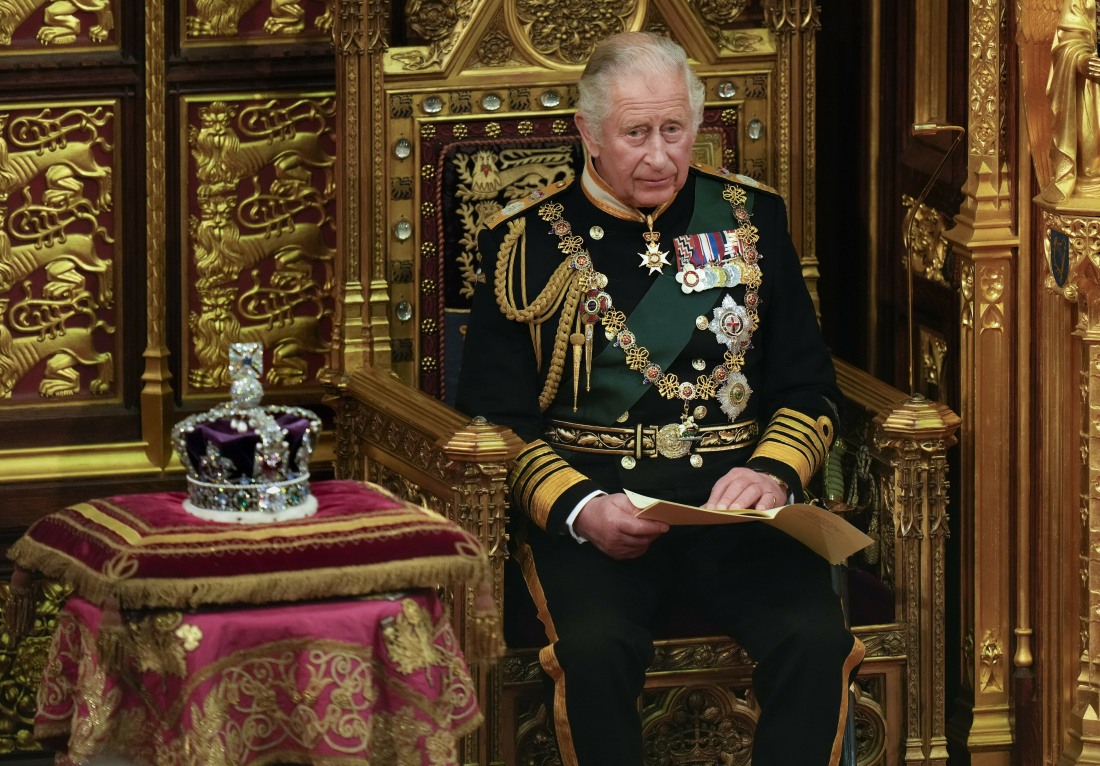
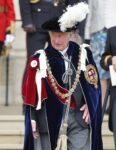
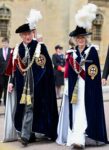
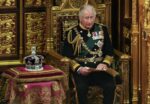
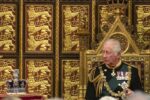
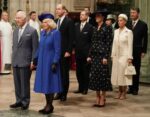
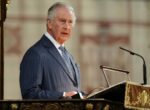
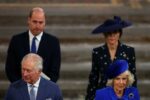
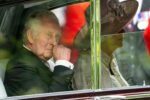
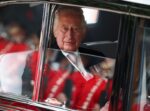
Leave a reply